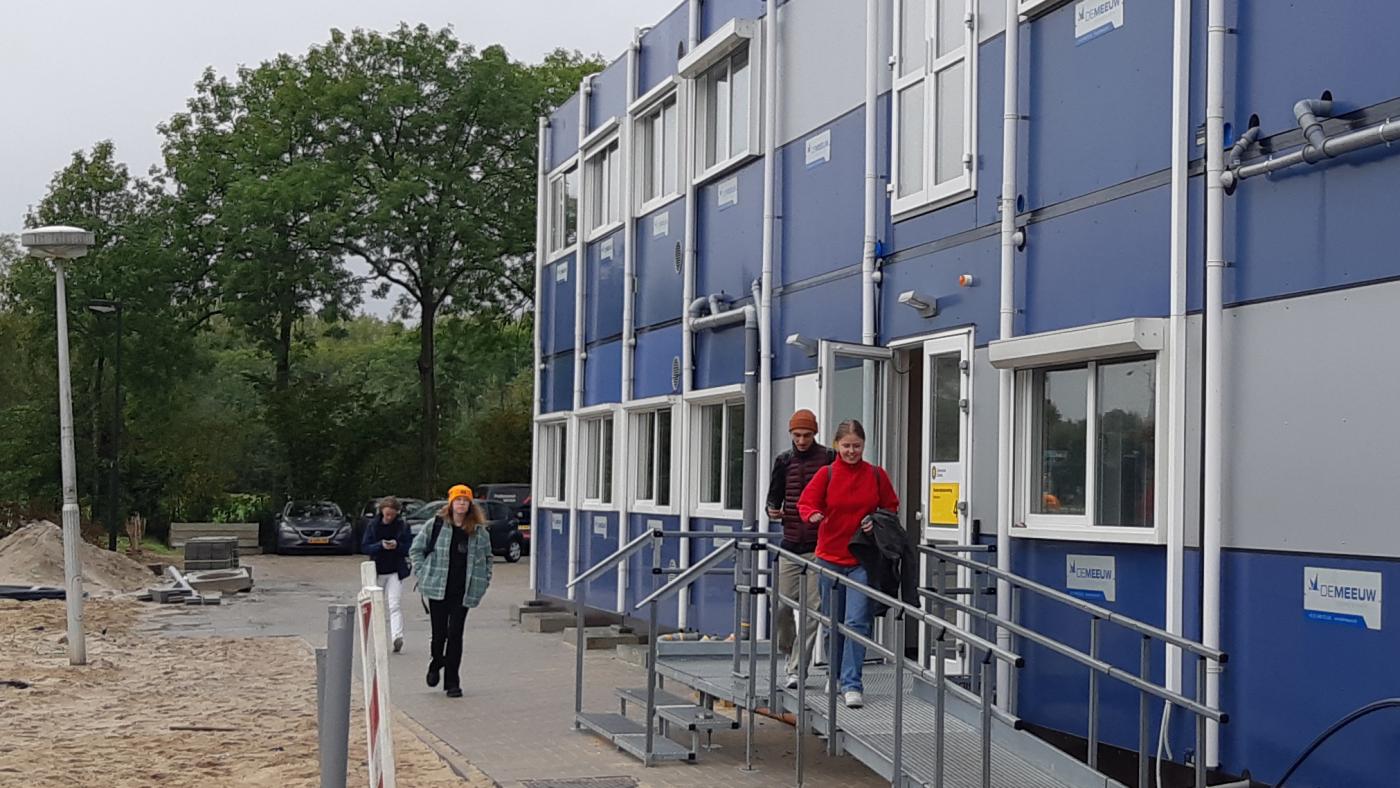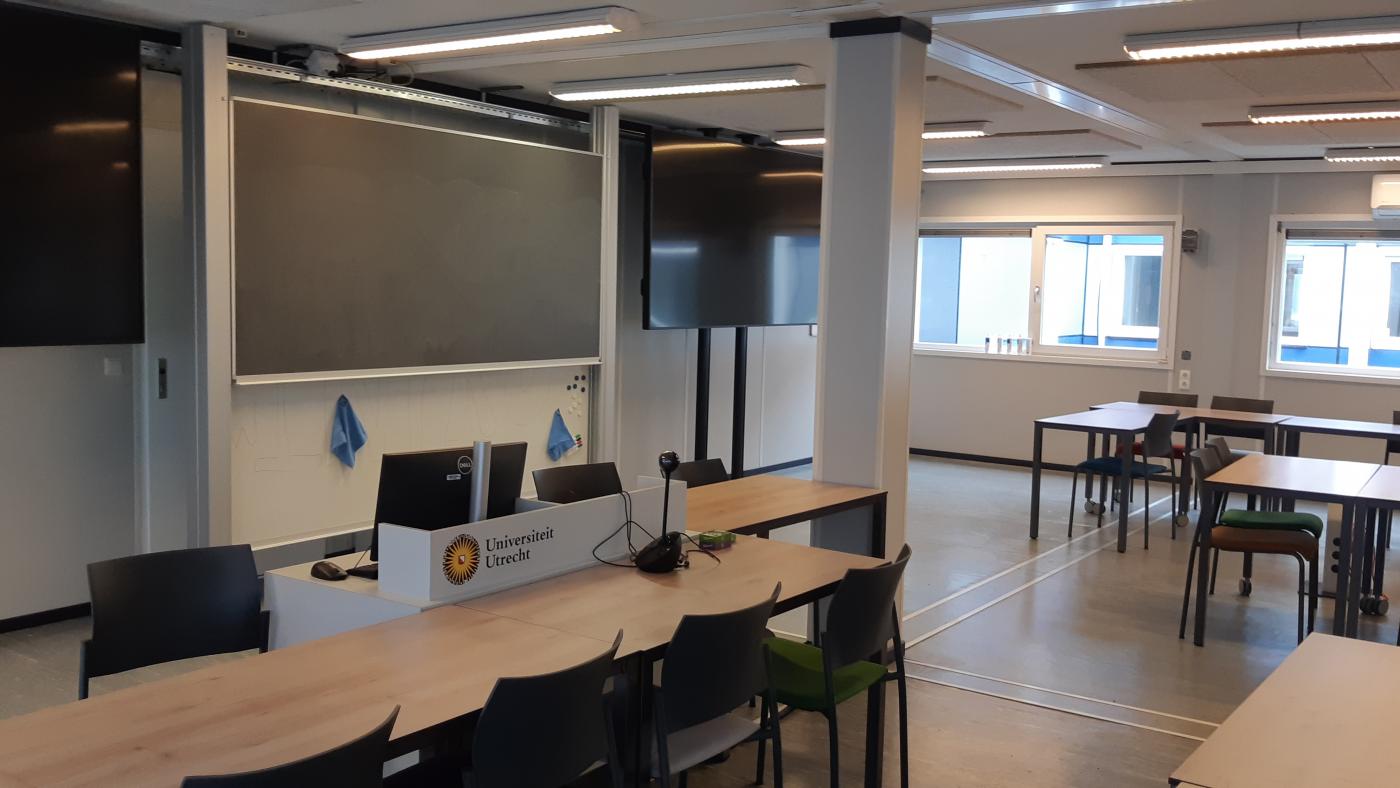Temporary building on Padualaan inaugurated
Lecturers worry about tight schedule

The grey linoleum floor is full of sandy footprints. The walls are white and bare, adorned only by the swinging fireproof doors. The blue, pre-fabricated building has fourteen spacious workgroup rooms which will be officially put to use as of October 3. The idea is to help mitigate a shortage of lecture halls at Utrecht University in the current — and possibly also in the next — academic year.
It’s not crowded at all these first few weeks. On a Friday afternoon, only one room is occupied by students participating in the Academic Writing and Presentation workgroups of the Bachelor's programme in Global Sustainability Science.
Since it wasn't clear when exactly the temporary building would be inaugurated, the university's schedulers were not able to include the new rooms in the schedules of the first two blocks. For now, the only educational activities that have been transferred to Padualaan are those that, by necessity, were taking place in eight rooms that are not intended for teaching.
“In the second block – and definitely in the third one – the building is sure to be much more crowded”, says Miranda van Heesch, the point of contact for the scheduling of the Faculties of Science, Geosciences and Social Sciences.
No problem with the portable building
Asked how they like the new lecture halls, some first-year students shrug. "It's okay," says Rachel, who spent some time looking for the entrance. “As long as we're being taught, I don’t care about the place. I don't mind it being here."
International student Zech says: “I don’t know why this building had to be built but, for something temporary, it looks like there's nothing wrong with it. It has everything and it all works.”
Pien is studying upstairs before her next lecture starts. This is her first time in the building and she had to ask her classmates what the name "Porta" in her schedule meant. But she has no complaints about the new rooms. “I would prefer to be taught at the lecture halls in the Koningsberger building or the Buys Ballot building, of course, as they are close to our faculty. But the Wi-fi works here, it’s warm and, fortunately, not too far away.”

Enough rooms this year
The delayed completion of the Padualaan building caused a lot of commotion at the Faculties of Science, Social Sciences and Geosciences. For a minute, it looked like the faculties would have to schedule more classes late in the evening or on weekends due to a lack of lecture halls. Others feared they would be forced to minister classes partially online.
This didn't come to pass, albeit with some acrobatic efforts. Now that the temporary lecture halls in the Padualaan building have been officially inaugurated, there is enough space available for this year’s schedule at least, according to the university.
This autumn, there was another hitch. The Utrecht University of Applied Sciences announced its intention to use thirteen of nearly forty halls currently rented by UU on Bolognalaan for its own educational activities from 2023 onwards. A solution has been found for this predicament too. Starting on the second block, UU will also rent the three lower floors of the building located at Daltonlaan, 500. Right now, the university already rents four of its floors.
Lecturers afraid of work overload
The question now is how the need for lecture halls is going to evolve in the years to come. Next academic year, Medicine students will be able to return to the then-renovated Hijmans van den Bergh building, which will relieve some of the pressure. But the number of students keeps growing year after year, which means this will not be enough in the long run.
The Executive Board will discuss with the faculties whether they can slow down the growth in the number of students. The board has already said that it is not possible to build new accommodations, as long as the university doesn’t want to spend more than the appointed maximum of 15 percent of its income on housing. They think that online education might be a way out.
Lecturers and students should also be prepared to teach and be taught in the evening. For starters, the timeslot between 5:00 pm and 7:00 pm is set to become a regular occurrence in UU's scheduling, but it's possible that classes will have to take place even later.
This month, the teachers from the faculties housed in the Utrecht Science Park manifested their concern about this situation. At the faculties of Science and Social Sciences, council members fear that the lack of lecture halls will lead to work overload, causing an even greater imbalance between work and private life, not to mention the possibility of a loss of education quality.
Even more work for teachers
Suzan Ruijtenberg, a council member at the Faculty of Science, wondered during the meeting whether the actual lack of space is more significant than the university thinks. She explained to DUB that many teachers are already making changes to their classes, splitting up groups or coming up with online alternatives (“and no teacher actually prefers teaching online”) because they presume there won’t be any lecture halls available.
“So, teachers have simply stopped asking. They prefer being flexible and thinking along with the university. Because of that, schedulers assume that everything is OK and there is no need for additional facilities. But, in the meantime, lecturers have got more work to do and students are not receiving the most optimal education. Right now, the problem has more to do with practice halls but I wonder if it is visible to everyone.”
As an example, Ruijtenberg mentions the first lecture for first-year Biology students this past September. “Normally, that's an introductory meeting that takes an hour and a half. But, this year, there were 400 first-year students. They didn’t fit in the biggest room available, which had a maximum capacity of 225. As a result, we decided to split the group in half and only offer 45-minute sessions. That's really unfortunate, especially for a first meeting.”
More evening classes
Concerned members of the council of the Faculty of Social Sciences talked to the Faculty Board about the new policy which posits that a minimum of ten percent of the classes have to be scheduled in the unpopular 5:00-7:00 pm timeslot. They were told that, next year, this will probably rise to fifteen percent. The programmes that don’t achieve these percentages run the risk of getting fewer lecture halls in their preferred times and locations in the next few years.
The chair of the personnel division, Ellen Reitz, writes in an email to DUB: “Due to this issue, the teachers have to (once again) be flexible and accommodating. In some cases, this can lead to a higher workload. It is hard for the coordinators to choose between timeslots when the teaching team is not known yet. You are then forced to determine for others whether they need to work between 5:00 and 7:00 pm, which is not advisable.”
The fact that consecutive lectures are being scheduled more and more in buildings that are quite far apart from each other has also annoyed a few teachers, according to Reitz. Sometimes, avoiding that from happening is simply not achievable, she says, so teachers have to travel more. "And that time is not accounted for in the task description,” Reitz observes.
Therefore, the council members wonder how the project to improve the scheduling of the three faculties is faring, and whether it wouldn’t be better to examine the scheduling on a university-wide level. That is exactly what is going to happen. The new university-wide programme Education Logistics, is going to examine possibilities for a more effective and efficient scheduling process. The number of students, which keeps on rising, and the restrictions posed by the housing shortage must be taken into account.
Miranda van Heesch: “The wishes of teachers and students will have to be taken into consideration but concessions always have to be made. There are limits to the capacity. We have to look for the perfect balance.”